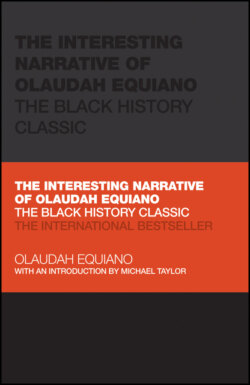The Interesting Narrative of Olaudah Equiano

Реклама. ООО «ЛитРес», ИНН: 7719571260.
Оглавление
Olaudah Equiano. The Interesting Narrative of Olaudah Equiano
Table of Contents
Guide
Pages
THE INTERESTING NARRATIVE OF OLAUDAH EQUIANO. The Black History Classic
INTRODUCTION
ENSLAVEMENT
WITNESS OF HISTORY
BUSINESS VENTURES AND FREEDOM
EMERGING ABOLITIONIST
THE NARRATIVE
EQUIANO THE CHRISTIAN
EQUIANO AND ECONOMICS
THE NARRATIVE'S IMPACT
AFTERMATH AND LEGACY
FURTHER READING
NOTE ON THE TEXT
NOTE
ABOUT MICHAEL TAYLOR
ABOUT TOM BUTLER-BOWDON
LIST OF SUBSCRIBERS
I
NOTES
II
III
IV
NOTES
V
NOTES
VI
VOLUME II
VII
NOTE
VIII
IX
X
NOTES
XI
XII
NOTES
EXPLANATORY NOTES. CHAPTER 1
CHAPTER 3
CHAPTER 4
CHAPTER 5
CHAPTER 6
CHAPTER 8
CHAPTER 9
CHAPTER 11
CHAPTER 12
WILEY END USER LICENSE AGREEMENT
Отрывок из книги
OLAUDAH EQUIANO
With an Introduction by
.....
As the opening passages of the Narrative make clear, slavery was nothing new to Equiano. At home in Benin, the houses of masters and their slaves made up the towns and villages. Equiano's own father had been a slaveholder, and the local slave trade was frequently the cause of ‘irruptions of one little state or district into another’. Yet in Equiano's view there were plain differences between African slavery and that into which Europeans forced him and so many millions of others. For one thing, Equiano almost appears to regard African enslavement as justifiable. ‘Sometimes indeed we sold slaves to them’, he writes of his neighbours, ‘but they were only prisoners of war, or such among us who had been convicted of kidnapping, or adultery, and some other crimes, which we esteemed heinous.’ In short, slavery was dependent on the character of the person, not their skin colour. ‘But how different was their condition from that of the slaves in the West Indies!’ Equiano exclaims. ‘With us they do no more work than other members of the community, even their masters; their food, clothing and lodging were nearly the same as theirs … Some of these slaves have even slaves under them as property, and for their own use.’
This contrasted sharply with what Equiano experienced at the hands of British slave traders. Just as Mary Prince would later educate British readers on the atrocities inflicted upon enslaved people in the West Indies of the 1820s, Equiano gave the readers of the 1780s a painful and often shocking account of the odious commerce. ‘Slaves are sometimes, by half-feeding, half-clothing, over-working and stripes, reduced so low’, he lamented, ‘that they are turned out as unfit for service, and left to perish in the woods, or expire on a dunghill.’ This hatred of slavery would not, however, prevent Equiano from buying enslaved people to work on the plantation that he sought to establish on the Mosquito Coast. Moreover, when Equiano eventually abandoned the project it was not because this apparent toleration of slavery had expired. Rather, it was because he disliked the lifestyle: ‘our mode of procedure and living in this heathenish form’ he writes, was ‘very irksome’.
.....